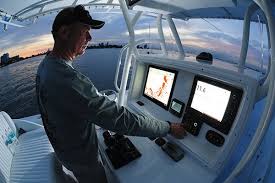
A VHF RADIO IS BEST FOR AN EMERGENCY
Fixed-Mount VHF Radios
Arguably one of the most cost-effective safety items you can have on any boat, a fixed-mount VHF allows you to communicate with a wide range of people and organizations: the U.S. Coast Guard, commercial ships, the Rescue 21 network, bridge tenders, TowBoatUS, race committees, and countless others stations. And its full potential is realized when units with Digital Selective Calling, or DSC, are connected to an operational GPS receiver (or have one internally).
While all radios sold in the U.S. over the last decade are equipped with DSC, many operators (the U.S. Coast Guard says about 85 percent) either have not connected their radios to their GPS, nor registered for an MMSI (Marine Mobile Service Identity) number. This is vital for the full functionality of the Rescue 21 system.
Fixed-mount VHF radios are only as good as their antenna systems (a combination of the antenna, coaxial cable, and connections). Antennas should be mounted as high as possible: on the masthead of a sailboat or on the flybridge of a powerboat. Because VHF signals travel more or less in a straight line, a higher antenna will allow a VHF signal to reach more distant stations due to the Earth’s curvature.
COMMON VHF CHANNELS AND THEIR USES
While VHF radios may have anywhere from 55 to 80 channels, there are relatively few that can be used by recreational boaters. This table lists the most common ones, but because VHF channel use is somewhat geographically specific, a few channels may be different in your home waters. The VHF channels used in Canada and Internationally may have different frequencies and different functions than those used in the U.S.
| Channel | Simplex/Duplex* | Purpose |
|---|---|---|
| 16 | Simplex | International distress, safety, and hailing. Monitoring required while underway. |
| 6 | Simplex | Intership safety. Frequently used by towing companies. |
| 22A | Simplex | U.S. Coast Guard working channel. Referred to as “22 Alpha.” Maritime Safety Information Broadcasts are announced on Channel 16, then broadcast on 22A. |
| 21A, 23A | Simplex | U.S. Coast Guard only. In rare instances, the Coast Guard may ask you to communicate with them on these channels. |
| 9 | Simplex | Boater calling (commercial and noncommercial). Recommended for hailing another vessel (to reduce traffic on Channel 16). Many radios can monitor 16, 9, and a working channel. |
| 13 | Simplex | Intership navigation safety. Ships are required to monitor Channel 13 when at sea. Effective if you are trying to contact a specific vessel in your area, especially if there is risk of collision. Transmissions are limited to 1W to reduce interference. |
| 14 | Simplex | Port operations. In areas with Vessel Traffic Service (VTS), this is the channel they use to communicate with large ship traffic. Can be very helpful for tracking vessels. |
| 24-28, 84-87 | Duplex | Port operations. In areas with Vessel Traffic Service (VTS), this is the channel they use to communicate with large ship traffic. Can be very helpful for tracking vessels. |
| 68, 69, 71, 78A | Simplex | For noncommercial communications with other vessels or shore stations. Traffic must be concise. Commonly used by race committees, along with Channel 72. |
| 72 | Simplex | Similar to previous channels but only for ship-to-ship. No land-based stations can use channel 72. |
| 70 | Simplex | Digital only; used by DSC functions on the radio. |
| WX 1-9 | Simplex | NOAA weather channels. Local weather is usually on WX1-WX4. |
| *A simplex channel transmits and receives on the same frequency. Duplex channels use different frequencies for transmitting and receiving. |
The Invaluable Phonetic Alphabet
To make sure you’re clearly understood, especially when using the VHF radio, words often need to be spelled out using what’s known as the phonetic alphabet. On a radio transmission, static can produce mistakes. For instance, over the past couple of years, a popular boat name, according to our BoatUS records, has been Blew By You. In audio communications, this can be mistaken for Blue Bayou.
Learn the phonetic alphabet by heart so that you can easily spell out names and words quickly, especially in emergency situations.
| A Alpha | G Golf | M Mike | S Sierra | Y Yankee |
| B Bravo | H Hotel | N November | T Tango | Z Zulu |
| C Charlie | I India | O Oscar | U Uniform | |
| D Delta | J Juliet | P Papa | V Victor | |
| E Echo | K Kilo | Q Quebec | W Whiskey | |
| F Foxtrot | L Lima | R Romeo | X X-ray |